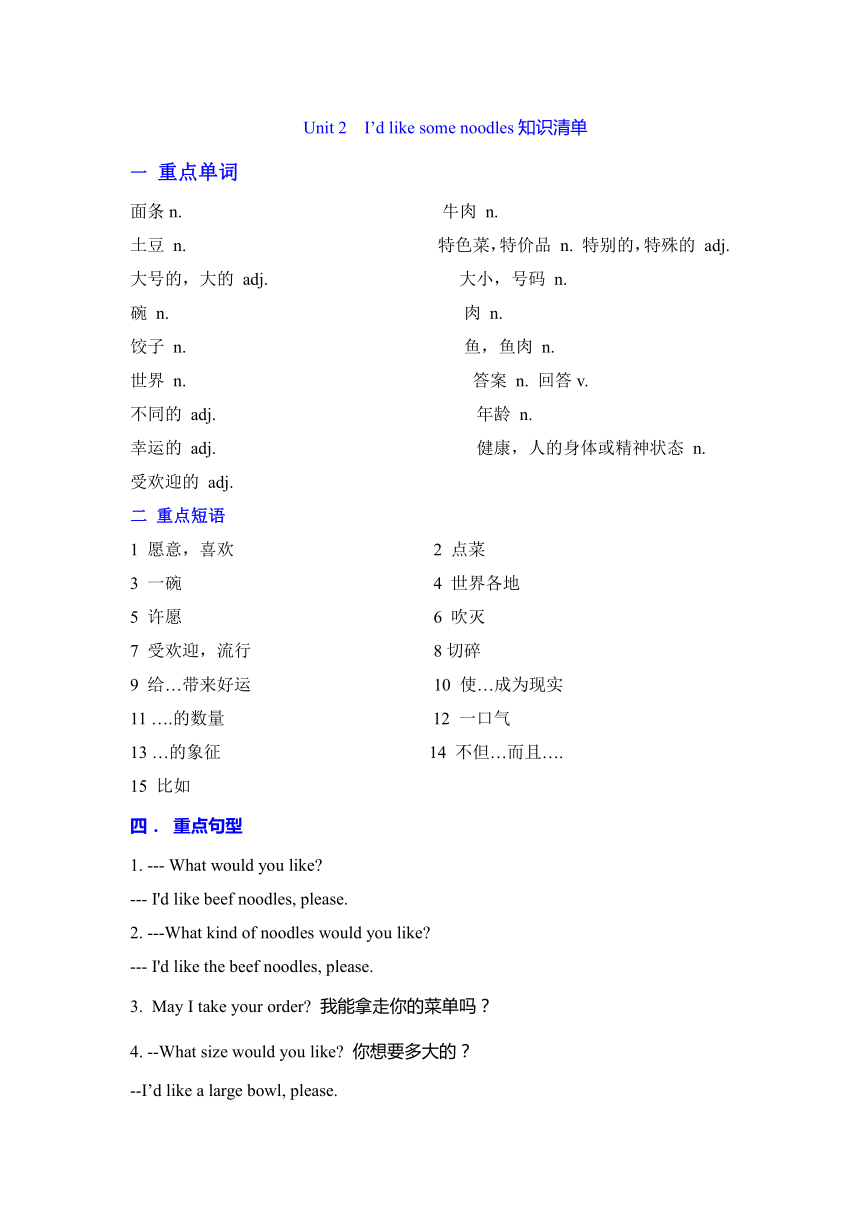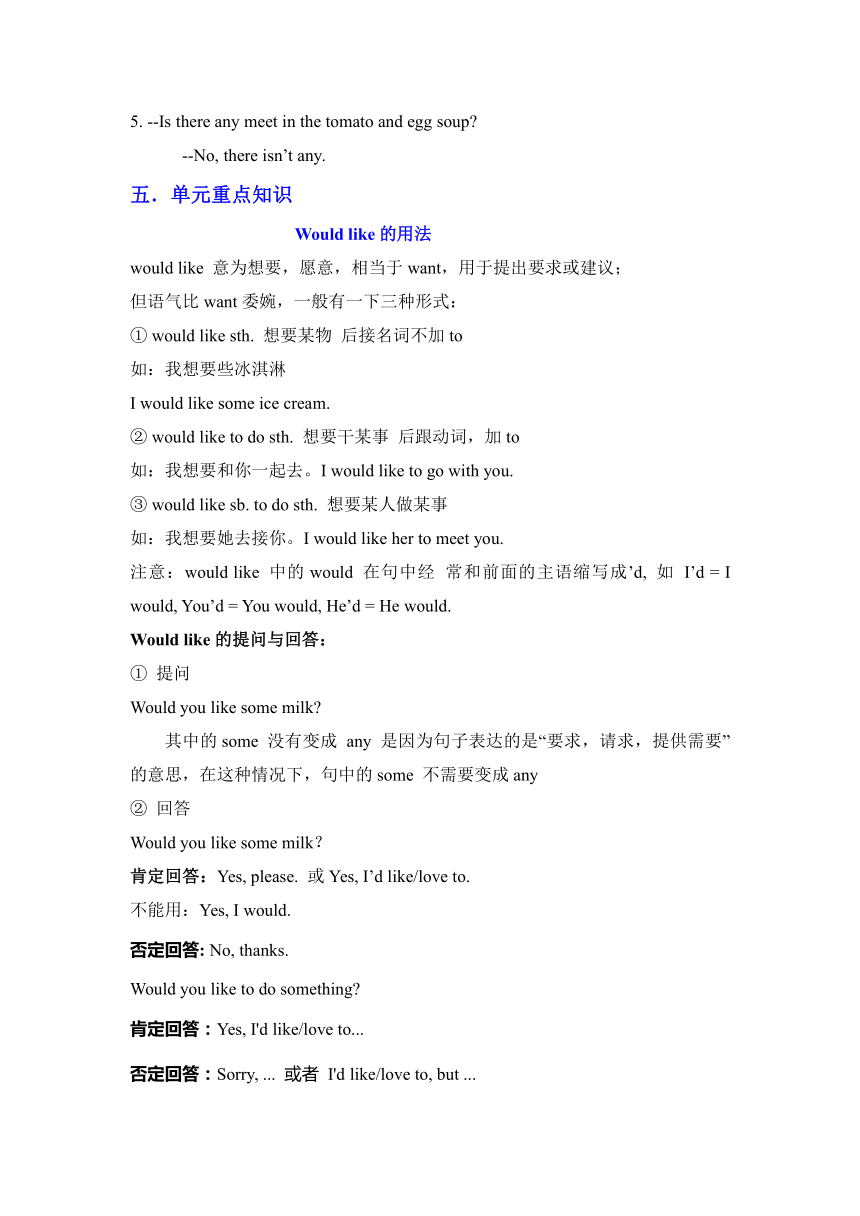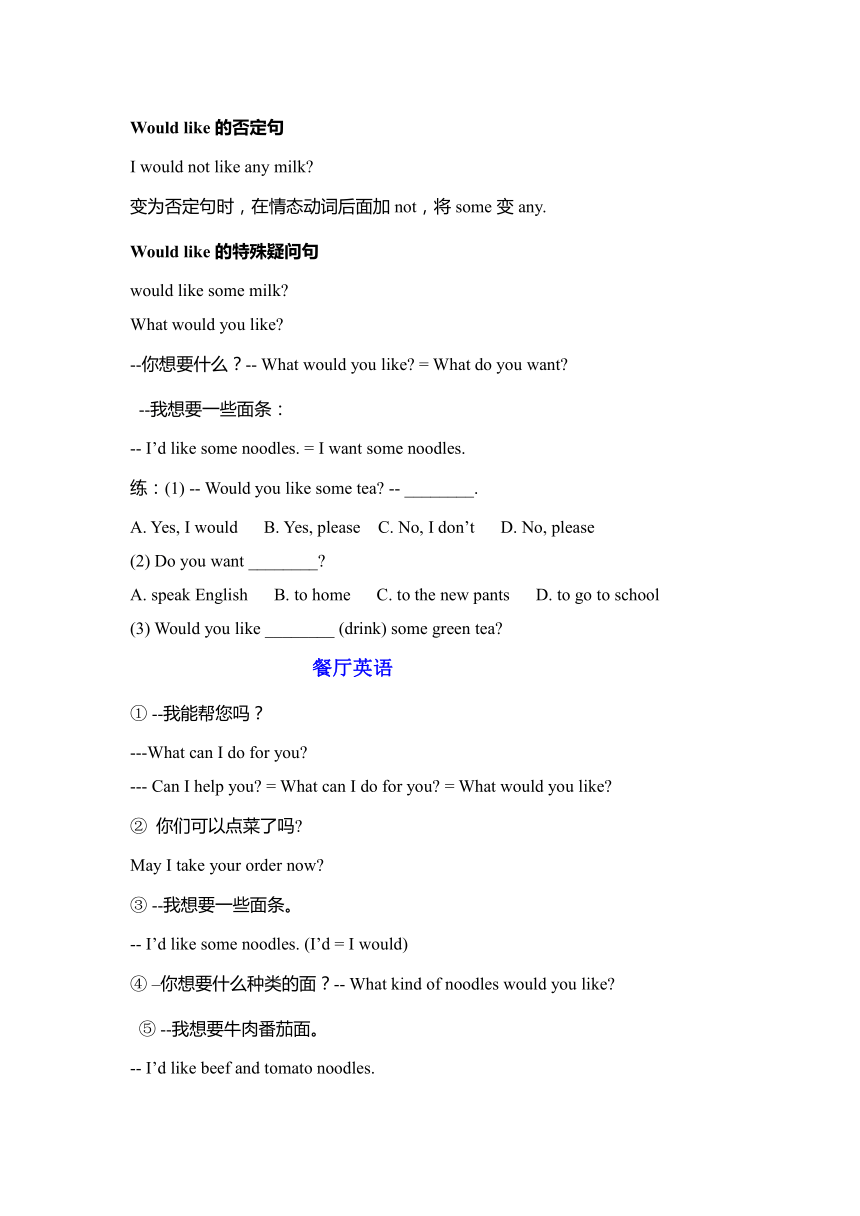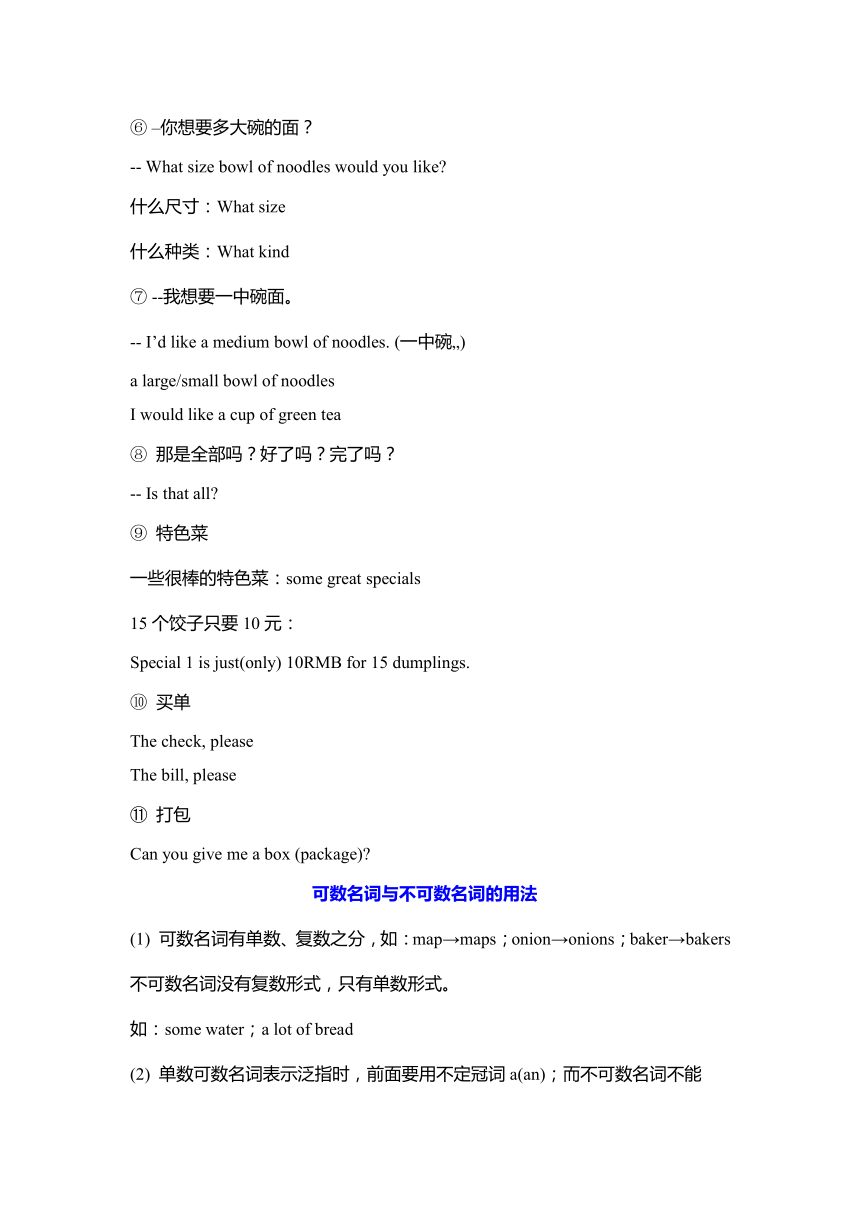Unit 2 I'd like some noodles.期末复习学案(无答案)
文档属性
| 名称 | Unit 2 I'd like some noodles.期末复习学案(无答案) |

|
|
| 格式 | docx | ||
| 文件大小 | 30.9KB | ||
| 资源类型 | 教案 | ||
| 版本资源 | 鲁教版 | ||
| 科目 | 英语 | ||
| 更新时间 | 2024-01-17 00:00:00 | ||
图片预览





文档简介
Unit 2 I’d like some noodles知识清单
一 重点单词
面条n. 牛肉 n.
土豆 n. 特色菜,特价品 n. 特别的,特殊的 adj.
大号的,大的 adj. 大小,号码 n.
碗 n. 肉 n.
饺子 n. 鱼,鱼肉 n.
世界 n. 答案 n. 回答v.
不同的 adj. 年龄 n.
幸运的 adj. 健康,人的身体或精神状态 n.
受欢迎的 adj.
二 重点短语
1 愿意,喜欢 2 点菜
3 一碗 4 世界各地
5 许愿 6 吹灭
7 受欢迎,流行 8切碎
9 给…带来好运 10 使…成为现实
11 ….的数量 12 一口气
13 …的象征 14 不但…而且….
15 比如
四. 重点句型
1. --- What would you like
--- I'd like beef noodles, please.
2. ---What kind of noodles would you like
--- I'd like the beef noodles, please.
May I take your order 我能拿走你的菜单吗?
4. --What size would you like 你想要多大的?
--I’d like a large bowl, please.
5. --Is there any meet in the tomato and egg soup
--No, there isn’t any.
五.单元重点知识
Would like的用法
would like 意为想要,愿意,相当于want,用于提出要求或建议;
但语气比want委婉,一般有一下三种形式:
① would like sth. 想要某物 后接名词不加to
如:我想要些冰淇淋
I would like some ice cream.
② would like to do sth. 想要干某事 后跟动词,加to
如:我想要和你一起去。I would like to go with you.
③ would like sb. to do sth. 想要某人做某事
如:我想要她去接你。I would like her to meet you.
注意:would like 中的would 在句中经 常和前面的主语缩写成’d, 如 I’d = I would, You’d = You would, He’d = He would.
Would like的提问与回答:
① 提问
Would you like some milk
其中的some 没有变成 any 是因为句子表达的是“要求,请求,提供需要”的意思,在这种情况下,句中的some 不需要变成any
② 回答
Would you like some milk?
肯定回答:Yes, please. 或Yes, I’d like/love to.
不能用:Yes, I would.
否定回答: No, thanks.
Would you like to do something
肯定回答:Yes, I'd like/love to...
否定回答:Sorry, ... 或者 I'd like/love to, but ...
Would like的否定句
I would not like any milk
变为否定句时,在情态动词后面加not,将some变any.
Would like的特殊疑问句
would like some milk
What would you like
--你想要什么?-- What would you like = What do you want
--我想要一些面条:
-- I’d like some noodles. = I want some noodles.
练:(1) -- Would you like some tea -- ________.
A. Yes, I would B. Yes, please C. No, I don’t D. No, please
(2) Do you want ________
A. speak English B. to home C. to the new pants D. to go to school
(3) Would you like ________ (drink) some green tea
餐厅英语
① --我能帮您吗?
---What can I do for you
--- Can I help you = What can I do for you = What would you like
② 你们可以点菜了吗
May I take your order now
③ --我想要一些面条。
-- I’d like some noodles. (I’d = I would)
④ –你想要什么种类的面?-- What kind of noodles would you like
⑤ --我想要牛肉番茄面。
-- I’d like beef and tomato noodles.
⑥ –你想要多大碗的面?
-- What size bowl of noodles would you like
什么尺寸:What size
什么种类:What kind
⑦ --我想要一中碗面。
-- I’d like a medium bowl of noodles. (一中碗 )
a large/small bowl of noodles
I would like a cup of green tea
⑧ 那是全部吗?好了吗?完了吗?
-- Is that all
⑨ 特色菜
一些很棒的特色菜:some great specials
15个饺子只要10元:
Special 1 is just(only) 10RMB for 15 dumplings.
⑩ 买单
The check, please
The bill, please
打包
Can you give me a box (package)
可数名词与不可数名词的用法
(1) 可数名词有单数、复数之分,如:map→maps;onion→onions;baker→bakers 不可数名词没有复数形式,只有单数形式。
如:some water;a lot of bread
(2) 单数可数名词表示泛指时,前面要用不定冠词a(an);而不可数名词不能
用a(an)。
如: Li Hong is a driver. I am a teacher.
李红是一名司机,我是一名教师。
We can’t see milk on the table. 我们看不见桌上有牛奶。
[友情提醒]在表示特指时,不可数名词和可数名词前都要用定冠词the, 如:Pass me the ball,please. 请把球传给我。
The chicken on the plate is yours. 盘子里的鸡肉是你的。
(3) 可数名词表示复数意义时可用many, a few, few等词修饰。
如:many apples; a few pens
不可数名词则要用much、a little, little等词修饰。
如:much meat a little bread little water
[友情提醒]这两类名词都可以被 some、any、a lot of(lost of)等修饰。
如:some eggs/paper(纸)
A lot of (lots of) knives/orange juice
(4) 可数名词前通常可用具体的数词来修饰。
如:three women ten babies
不可数名词表示数量的多少时,必须与表示数量的名词连用,即“数词+表示数量的名词(可数名词)+of+不可数名词”。
如:two glasses of milk 两杯牛奶
five pieces of bread 五片面包
(5) 可数名词作主语时,谓语动词的单、复数与主语的单、复数须保持一致。
不可数名词作主语时,谓语动词只能用单数形式。
如: There is some rice in the bowl.碗里有些米饭。
All the students are in the classroom.所有的学生都在教室里。
[友情提醒]如果不可数名词前有复数名词短语修饰时,谓语动词须用复数形式。如:There are two bags of rice in the room. 房间里有两袋大米。
(6) 对可数名词的数量提问用how many;对不可数名词的数量提问要用
how much,但对不可数名词前表示数量名词中的修饰语提问时要用
how many。
如:
---I can see two pictures on the wall.
--- How many pictures can you see on the wall
---There is a lot of pork in the basket.
--- How much pork is there in the basket
---I want three glasses of water.
---How many glasses of water do you want
(7) 有些名词有时是可数,有时是不可数
如:fish表示条数或数量时,可数,表示鱼肉时,不可数
There are three fish in the bowl. 鱼缸里有三条鱼。(表示条数,单复数相同)
There are three fishes in the bowl. 鱼缸里有三种鱼 (表示种类,复数加es)
I like fish. 我喜欢鱼肉。(不可数)
Fish还可以做动词,表示钓鱼
Would you like go fishing with me 你想和我去钓鱼吗?
(8) 有些集合名词也是可数名词,但不同的是,它们以单数形式出现,表示复数概念,如people,police,family等;
而有些可数名词本身就以复数形式出现,如clothes,glasses(眼镜)等; 有的可数名词单、复数形式相同,如Japanese,sheep,Chinese等。 如: The Chinese people are hardworking and brave.中国人民勤劳勇敢。
The sports clothes are new. 这些运动服是新的。
I have one sheep. He has two sheep. 我有一只羊,他有三只羊
六 课本知识点
Section A
1 I’m not sure yet
① 指我不太确定,用来表示把握性不大的事情
②yet用作副词,还,仍然,已经的意思。通常用于否定句或疑问句,置于句末。
Is everything ready yet? 一切都准备好了吗?
2 Are there any vegetables in the beef noodles?
①any 不定代词,一些,一点儿,一般用于疑问句或否定句
Do you have____ (一些)money?
I don’t have____ money 我没钱
3 There are some tomatoes
some意思为一些,修饰可数名词复数或不可数名词,用于肯定句
I have____(一些) apples
There is ____ water in the glass
4 what kind of noodles would you like
①what kind of … would you like 用来询问某人想要什么样的东西。
What kind of 意思为: ____
你喜欢什么样的音乐?
what kind of ____ would you like
你喜欢什么样的电影?
what kind of___ would you like?
②kind 此处为可数名词,意思为种类
常有短语:
a kind of _________
all kinds of _________
different kinds of_________
There are _________(不同类型的)animals in the zoo
5 May I take your order?
①是服务员请客人点餐时的礼貌用语,
②order用作可数名词,意思为点菜,订购。也可用作动词,订购,命令的意思
I want to_____ (订购)the book from this bookstore
I order(命令) you to stay here
6 what size would you like?
what size 用来询问物体的大小,尺寸的常用句型。Size既可用来表示物体的大小,又可表示服装或鞋帽的尺码,号码。
----What size shoes does your mother wear?
-----Size 8
Setion B
1 fish
①可用作不可数名词,意思为鱼肉
I would like _____(鱼肉)for dinner
②fish用作可数名词,意思为鱼,表示鱼的数量时,单复数相同,表示鱼的种类时复数形式为:_________
There ____ three fish in the fish tank
There are all kinds of ____(fish) in the sea
注意: go fishing:_________
2 I don’t like onions, green tea or porridge
①or 此处用作并列连词,意思为和,常用于否定句中代替肯定句中的and
I don’t like chicken ____ beef
② or,可用作祈使句,意思为否则
Hurry up,_____(否则) you will be late for school.
3 Drinks 饮料
①此处用作可数名词复数。意思为饮料,强调种类
We have different kinds of _____(饮料)
②若drink被视为物质名词,则为不可数名词,则为不可数名词
尤其用于food and drink 这一搭配中
We can’t live without ____(事物和饮料)
③drink 及物动词,饮,喝
我们喝杯咖啡吧
Let’s ____(drink) coffee
4 birthday food around the world
around the world 世界各地 相当于all over the world,此处为介词短语作后置定语修饰birthday food
5 The answer would be different in different countries
①answer此处用作可数名词,意为答案,回答,后面接to表示….的答案
我不知道这个问题的答案
I don’t know the answer ____ this question
answer做动词,意思为:_________
请回答我的问题:_________
②different 形容词,不同的
本句中第一个different做表语
第二个different做定语
注意短语:be different from 与…不同
My pens_______________ yours 我的钢笔不同于你的
其副词形式为:_________
名词形式为:_________
5 The number of candles is the person’s age
①the number of …的数量,后跟名词复数,但谓语动词用单数
The number of ____(学生)in the room ___(be) 50
房间里学生的数量为50人
②注意和a number of 意思为: 许多,大量…,后跟复数名词,
但谓语动词用复数
A number of _____(学生)____(be) playing the basketball
③age 意思为:_________
at age of 在几岁时
在四岁时:_________
注意问年龄的两个句子
What is one’s age?和How old be sb?
Tom 几岁了?
说法一:_________
说法二:_________
6 The child with the candy is lucky
lucky 为形容词,_________
名词: _________ 副词:_________
7 They think seaweed soup is good for health
辨析:be good for be good with be good at
be good for 对…有好处,有益
be good at 擅长做…,后接名词,代词,或动名词
be good with 善于应付…..
Doing morning exercise _____ _____ ____ your health
I am good at____(play)basketball
He is very good ____ children 他对孩子很有一套
8 In China,it is getting popular to have cake on one’s birthday
①句中it 为形式主语,真正的主语是后面的动词不定式to have cake on ones birthday
②get popular 变得流行 注意短语:be popular with 受到…的欢迎
Pop music ____ ___ ____ young people
9 They never cut up the noodles because the long noodles are a symbol of long life.
①cut up 切碎 为动词+副词的结构。
与it them 等人称代词连用时,放于两词之间
与名词连用时,可放于之间,也可放于后面
例:把它们切碎:_________
把蔬菜切碎:_________
② a symbol of …的象征
长城是中国的象征The Great Wall is ____ ____ ____ China
10 All of these birthday foods may be different,but the ideas are the same.
①food表示食物时,是不可数名词,当用来表示食物种类时是可数名词。在此处,birthday foods指的是各种各样的生日食物,强调的是种类。
We have lots of _____(食物),like fish,beef and chicken
② idea 为可数名词,复数为:_________
have no idea 意思为:_________
11 In China,people eat not only birthday cakes but also birthday noodles
①Not only ...but also 不但...而且...,连接两个并列成分
她不但漂亮而且聪明:_________
②当其连接两个并列主语时,谓语动词遵循“就近原则”
不仅我,还有他都累了。Not only I but also he ___ tired
12 How can a person make his or her birthday wish come true?
Make...come true 使...成为现实
Come true:_________
I hope my dream can ___________(成为现实)
13 Ask for the order
Ask for 请求,要求,寻求。Ask sb for sth 向某人要某物
你可以向父母寻求帮助
You can _____ your teacher ____ help
他向父亲要100美元
He asked his father ____ 100 dollars
七 练习题
单选题
1. -- I don’t like mutton _____ beef.
-- I don’t like mutton, _____ I like beef a lot.
A. and, but B. and, and C. or, but D. or, and
2. Some chicken _____ in the bowl. And some eggs ______ on the table.
A. is, is B. are, are C. is, are D.are, is
3.-- _____ of shoes do you wear
-- Size 7.
A. What B. What size C. What kind D. What color
4. --Would you like some tea
--_________.
A. Yes, please. B. No, please. C. No, I don’t. D. Yes, I would
5. There ________ some beef on the table.
A. have B. are C. is D. has
6. We have music _____ Monday and Wednesday.
A. in B. on C. at D. /
7. He likes English ________ it’s fun.
A. when B. why C. because D. where
8. Mike and I ____ English now.
A. reads B. is reading C. read D. am reading
用所给词的适当形式填空
1. The number of students in my class________(be) over forty.
2._______(be) there any bread in the bowl
3. My son takes some photos in__________(differently) places.
4. What about________(drink) some green tea
5.Lucy and Lily’s room______(be) beautiful.
一 重点单词
面条n. 牛肉 n.
土豆 n. 特色菜,特价品 n. 特别的,特殊的 adj.
大号的,大的 adj. 大小,号码 n.
碗 n. 肉 n.
饺子 n. 鱼,鱼肉 n.
世界 n. 答案 n. 回答v.
不同的 adj. 年龄 n.
幸运的 adj. 健康,人的身体或精神状态 n.
受欢迎的 adj.
二 重点短语
1 愿意,喜欢 2 点菜
3 一碗 4 世界各地
5 许愿 6 吹灭
7 受欢迎,流行 8切碎
9 给…带来好运 10 使…成为现实
11 ….的数量 12 一口气
13 …的象征 14 不但…而且….
15 比如
四. 重点句型
1. --- What would you like
--- I'd like beef noodles, please.
2. ---What kind of noodles would you like
--- I'd like the beef noodles, please.
May I take your order 我能拿走你的菜单吗?
4. --What size would you like 你想要多大的?
--I’d like a large bowl, please.
5. --Is there any meet in the tomato and egg soup
--No, there isn’t any.
五.单元重点知识
Would like的用法
would like 意为想要,愿意,相当于want,用于提出要求或建议;
但语气比want委婉,一般有一下三种形式:
① would like sth. 想要某物 后接名词不加to
如:我想要些冰淇淋
I would like some ice cream.
② would like to do sth. 想要干某事 后跟动词,加to
如:我想要和你一起去。I would like to go with you.
③ would like sb. to do sth. 想要某人做某事
如:我想要她去接你。I would like her to meet you.
注意:would like 中的would 在句中经 常和前面的主语缩写成’d, 如 I’d = I would, You’d = You would, He’d = He would.
Would like的提问与回答:
① 提问
Would you like some milk
其中的some 没有变成 any 是因为句子表达的是“要求,请求,提供需要”的意思,在这种情况下,句中的some 不需要变成any
② 回答
Would you like some milk?
肯定回答:Yes, please. 或Yes, I’d like/love to.
不能用:Yes, I would.
否定回答: No, thanks.
Would you like to do something
肯定回答:Yes, I'd like/love to...
否定回答:Sorry, ... 或者 I'd like/love to, but ...
Would like的否定句
I would not like any milk
变为否定句时,在情态动词后面加not,将some变any.
Would like的特殊疑问句
would like some milk
What would you like
--你想要什么?-- What would you like = What do you want
--我想要一些面条:
-- I’d like some noodles. = I want some noodles.
练:(1) -- Would you like some tea -- ________.
A. Yes, I would B. Yes, please C. No, I don’t D. No, please
(2) Do you want ________
A. speak English B. to home C. to the new pants D. to go to school
(3) Would you like ________ (drink) some green tea
餐厅英语
① --我能帮您吗?
---What can I do for you
--- Can I help you = What can I do for you = What would you like
② 你们可以点菜了吗
May I take your order now
③ --我想要一些面条。
-- I’d like some noodles. (I’d = I would)
④ –你想要什么种类的面?-- What kind of noodles would you like
⑤ --我想要牛肉番茄面。
-- I’d like beef and tomato noodles.
⑥ –你想要多大碗的面?
-- What size bowl of noodles would you like
什么尺寸:What size
什么种类:What kind
⑦ --我想要一中碗面。
-- I’d like a medium bowl of noodles. (一中碗 )
a large/small bowl of noodles
I would like a cup of green tea
⑧ 那是全部吗?好了吗?完了吗?
-- Is that all
⑨ 特色菜
一些很棒的特色菜:some great specials
15个饺子只要10元:
Special 1 is just(only) 10RMB for 15 dumplings.
⑩ 买单
The check, please
The bill, please
打包
Can you give me a box (package)
可数名词与不可数名词的用法
(1) 可数名词有单数、复数之分,如:map→maps;onion→onions;baker→bakers 不可数名词没有复数形式,只有单数形式。
如:some water;a lot of bread
(2) 单数可数名词表示泛指时,前面要用不定冠词a(an);而不可数名词不能
用a(an)。
如: Li Hong is a driver. I am a teacher.
李红是一名司机,我是一名教师。
We can’t see milk on the table. 我们看不见桌上有牛奶。
[友情提醒]在表示特指时,不可数名词和可数名词前都要用定冠词the, 如:Pass me the ball,please. 请把球传给我。
The chicken on the plate is yours. 盘子里的鸡肉是你的。
(3) 可数名词表示复数意义时可用many, a few, few等词修饰。
如:many apples; a few pens
不可数名词则要用much、a little, little等词修饰。
如:much meat a little bread little water
[友情提醒]这两类名词都可以被 some、any、a lot of(lost of)等修饰。
如:some eggs/paper(纸)
A lot of (lots of) knives/orange juice
(4) 可数名词前通常可用具体的数词来修饰。
如:three women ten babies
不可数名词表示数量的多少时,必须与表示数量的名词连用,即“数词+表示数量的名词(可数名词)+of+不可数名词”。
如:two glasses of milk 两杯牛奶
five pieces of bread 五片面包
(5) 可数名词作主语时,谓语动词的单、复数与主语的单、复数须保持一致。
不可数名词作主语时,谓语动词只能用单数形式。
如: There is some rice in the bowl.碗里有些米饭。
All the students are in the classroom.所有的学生都在教室里。
[友情提醒]如果不可数名词前有复数名词短语修饰时,谓语动词须用复数形式。如:There are two bags of rice in the room. 房间里有两袋大米。
(6) 对可数名词的数量提问用how many;对不可数名词的数量提问要用
how much,但对不可数名词前表示数量名词中的修饰语提问时要用
how many。
如:
---I can see two pictures on the wall.
--- How many pictures can you see on the wall
---There is a lot of pork in the basket.
--- How much pork is there in the basket
---I want three glasses of water.
---How many glasses of water do you want
(7) 有些名词有时是可数,有时是不可数
如:fish表示条数或数量时,可数,表示鱼肉时,不可数
There are three fish in the bowl. 鱼缸里有三条鱼。(表示条数,单复数相同)
There are three fishes in the bowl. 鱼缸里有三种鱼 (表示种类,复数加es)
I like fish. 我喜欢鱼肉。(不可数)
Fish还可以做动词,表示钓鱼
Would you like go fishing with me 你想和我去钓鱼吗?
(8) 有些集合名词也是可数名词,但不同的是,它们以单数形式出现,表示复数概念,如people,police,family等;
而有些可数名词本身就以复数形式出现,如clothes,glasses(眼镜)等; 有的可数名词单、复数形式相同,如Japanese,sheep,Chinese等。 如: The Chinese people are hardworking and brave.中国人民勤劳勇敢。
The sports clothes are new. 这些运动服是新的。
I have one sheep. He has two sheep. 我有一只羊,他有三只羊
六 课本知识点
Section A
1 I’m not sure yet
① 指我不太确定,用来表示把握性不大的事情
②yet用作副词,还,仍然,已经的意思。通常用于否定句或疑问句,置于句末。
Is everything ready yet? 一切都准备好了吗?
2 Are there any vegetables in the beef noodles?
①any 不定代词,一些,一点儿,一般用于疑问句或否定句
Do you have____ (一些)money?
I don’t have____ money 我没钱
3 There are some tomatoes
some意思为一些,修饰可数名词复数或不可数名词,用于肯定句
I have____(一些) apples
There is ____ water in the glass
4 what kind of noodles would you like
①what kind of … would you like 用来询问某人想要什么样的东西。
What kind of 意思为: ____
你喜欢什么样的音乐?
what kind of ____ would you like
你喜欢什么样的电影?
what kind of___ would you like?
②kind 此处为可数名词,意思为种类
常有短语:
a kind of _________
all kinds of _________
different kinds of_________
There are _________(不同类型的)animals in the zoo
5 May I take your order?
①是服务员请客人点餐时的礼貌用语,
②order用作可数名词,意思为点菜,订购。也可用作动词,订购,命令的意思
I want to_____ (订购)the book from this bookstore
I order(命令) you to stay here
6 what size would you like?
what size 用来询问物体的大小,尺寸的常用句型。Size既可用来表示物体的大小,又可表示服装或鞋帽的尺码,号码。
----What size shoes does your mother wear?
-----Size 8
Setion B
1 fish
①可用作不可数名词,意思为鱼肉
I would like _____(鱼肉)for dinner
②fish用作可数名词,意思为鱼,表示鱼的数量时,单复数相同,表示鱼的种类时复数形式为:_________
There ____ three fish in the fish tank
There are all kinds of ____(fish) in the sea
注意: go fishing:_________
2 I don’t like onions, green tea or porridge
①or 此处用作并列连词,意思为和,常用于否定句中代替肯定句中的and
I don’t like chicken ____ beef
② or,可用作祈使句,意思为否则
Hurry up,_____(否则) you will be late for school.
3 Drinks 饮料
①此处用作可数名词复数。意思为饮料,强调种类
We have different kinds of _____(饮料)
②若drink被视为物质名词,则为不可数名词,则为不可数名词
尤其用于food and drink 这一搭配中
We can’t live without ____(事物和饮料)
③drink 及物动词,饮,喝
我们喝杯咖啡吧
Let’s ____(drink) coffee
4 birthday food around the world
around the world 世界各地 相当于all over the world,此处为介词短语作后置定语修饰birthday food
5 The answer would be different in different countries
①answer此处用作可数名词,意为答案,回答,后面接to表示….的答案
我不知道这个问题的答案
I don’t know the answer ____ this question
answer做动词,意思为:_________
请回答我的问题:_________
②different 形容词,不同的
本句中第一个different做表语
第二个different做定语
注意短语:be different from 与…不同
My pens_______________ yours 我的钢笔不同于你的
其副词形式为:_________
名词形式为:_________
5 The number of candles is the person’s age
①the number of …的数量,后跟名词复数,但谓语动词用单数
The number of ____(学生)in the room ___(be) 50
房间里学生的数量为50人
②注意和a number of 意思为: 许多,大量…,后跟复数名词,
但谓语动词用复数
A number of _____(学生)____(be) playing the basketball
③age 意思为:_________
at age of 在几岁时
在四岁时:_________
注意问年龄的两个句子
What is one’s age?和How old be sb?
Tom 几岁了?
说法一:_________
说法二:_________
6 The child with the candy is lucky
lucky 为形容词,_________
名词: _________ 副词:_________
7 They think seaweed soup is good for health
辨析:be good for be good with be good at
be good for 对…有好处,有益
be good at 擅长做…,后接名词,代词,或动名词
be good with 善于应付…..
Doing morning exercise _____ _____ ____ your health
I am good at____(play)basketball
He is very good ____ children 他对孩子很有一套
8 In China,it is getting popular to have cake on one’s birthday
①句中it 为形式主语,真正的主语是后面的动词不定式to have cake on ones birthday
②get popular 变得流行 注意短语:be popular with 受到…的欢迎
Pop music ____ ___ ____ young people
9 They never cut up the noodles because the long noodles are a symbol of long life.
①cut up 切碎 为动词+副词的结构。
与it them 等人称代词连用时,放于两词之间
与名词连用时,可放于之间,也可放于后面
例:把它们切碎:_________
把蔬菜切碎:_________
② a symbol of …的象征
长城是中国的象征The Great Wall is ____ ____ ____ China
10 All of these birthday foods may be different,but the ideas are the same.
①food表示食物时,是不可数名词,当用来表示食物种类时是可数名词。在此处,birthday foods指的是各种各样的生日食物,强调的是种类。
We have lots of _____(食物),like fish,beef and chicken
② idea 为可数名词,复数为:_________
have no idea 意思为:_________
11 In China,people eat not only birthday cakes but also birthday noodles
①Not only ...but also 不但...而且...,连接两个并列成分
她不但漂亮而且聪明:_________
②当其连接两个并列主语时,谓语动词遵循“就近原则”
不仅我,还有他都累了。Not only I but also he ___ tired
12 How can a person make his or her birthday wish come true?
Make...come true 使...成为现实
Come true:_________
I hope my dream can ___________(成为现实)
13 Ask for the order
Ask for 请求,要求,寻求。Ask sb for sth 向某人要某物
你可以向父母寻求帮助
You can _____ your teacher ____ help
他向父亲要100美元
He asked his father ____ 100 dollars
七 练习题
单选题
1. -- I don’t like mutton _____ beef.
-- I don’t like mutton, _____ I like beef a lot.
A. and, but B. and, and C. or, but D. or, and
2. Some chicken _____ in the bowl. And some eggs ______ on the table.
A. is, is B. are, are C. is, are D.are, is
3.-- _____ of shoes do you wear
-- Size 7.
A. What B. What size C. What kind D. What color
4. --Would you like some tea
--_________.
A. Yes, please. B. No, please. C. No, I don’t. D. Yes, I would
5. There ________ some beef on the table.
A. have B. are C. is D. has
6. We have music _____ Monday and Wednesday.
A. in B. on C. at D. /
7. He likes English ________ it’s fun.
A. when B. why C. because D. where
8. Mike and I ____ English now.
A. reads B. is reading C. read D. am reading
用所给词的适当形式填空
1. The number of students in my class________(be) over forty.
2._______(be) there any bread in the bowl
3. My son takes some photos in__________(differently) places.
4. What about________(drink) some green tea
5.Lucy and Lily’s room______(be) beautiful.
同课章节目录
- Unit 1 What does he look like?
- Section A
- Section B
- Unit 2 I'd like some noodles.
- Section A
- Section B
- Unit 3 How was your school trip?
- Section A
- Section B
- Unit 4 What did you do last weekend?
- Section A
- Section B
- Unit 5 Where did you go on vacation?
- Section A
- Section B
- Unit 6 How often do you exercise?
- Section A
- Section B
- Unit 7 I'm more outgoing than my sister.
- Section A
- Section B
- Unit 8 What's the best movie theater?
- Section A
- Section B
